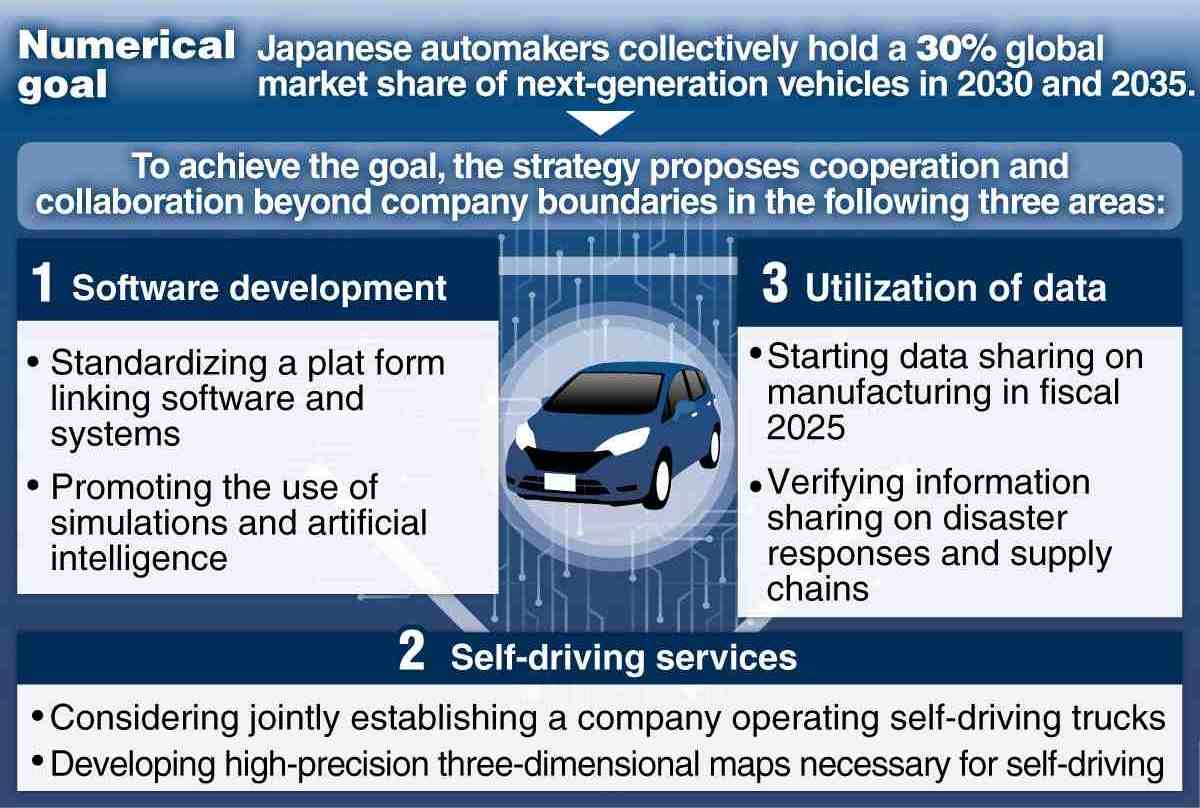Govt Aims for 30% Global Market Share of Japanese Next-Generation Vehicles; Inter-Company Cooperation, Collaboration Key

Government’s automotive digitalization strategy
1:00 JST, May 20, 2024
The government will aim to increase Japanese automakers’ global market share of software-defined vehicles (SDV) to 30% by 2030, according to a draft strategy for automotive industry digitalization the government is set to release shortly.
The government will help grow domestic automakers and encourage them to cooperate and collaborate beyond company boundaries, aiming to enhance the competitiveness of the automotive industry, the bread and butter of the Japanese economy, as Chinese and U.S. companies take the lead in the vehicle digitalization.
The Economy, Trade and Industry Ministry and the Land, Infrastructure, Transport and Tourism Ministry will announce the strategy as early as today. It will be the first time the government sets an automotive sales share target.
With the rise of companies in China and other countries in mind, the strategy warns of increased competition worldwide in the auto industry where Japan has long excelled. “Japanese automakers are encouraged to cooperate and collaborate with each other beyond competition,” the strategy says, citing three specific areas of cooperation and collaboration: (1) software development, (2) self-driving services, and (3) utilization of data.
An SDV is a vehicle that comes equipped with communication functions and can be updated via an internet connection, adding new functions and enhancing performance. The definition of SDV differs depending on the automaker, but the strategy defines them as vehicles with updatable controller systems, including driving.
The strategy estimates 41 million SDVs will be in use worldwide by 2030 and aims for 12 million Japanese SDVs to be on the road worldwide by the same year.
The strategy anticipates 64 million SDVs to be sold globally by 2035 and aims to maintain the combined share of Japanese automakers at 30%.
Currently, Japanese automakers collectively hold a 30% share of the global auto market, including gasoline vehicles, while their market share of electric vehicles (EVs) is said to be only a few percentage points. Given that the majority of SDVs will be electric powered, the strategy aims also to increase the production of hybrid SDVs, as hybrid vehicles are a specialty of Japanese automakers.
Cooperation in software development is key to pulling off the strategy. Toyota Motor Corp., Honda Motor Co. and Nissan Motor Co. are considering starting a partnership in fiscal 2025 to standardize the basic platform which serves as a link between the software and systems. Actualizing the strategy will enable parts and software from different automakers to be installed across companies, leading to greater developmental efficiency. These companies also will accelerate joint development of advanced automotive semiconductors and other products.
As for self-driving services, the government is considering establishing a new joint company to operate self-driving trucks. The measure is aimed at addressing the so-called “2024 logistics problem,” which refers to an expected shortage of truck drivers — assuming the new company’s self-driving vehicles will be used for transportation between major trade hubs. The government plans to use a devoted self-driving lane to be implemented on parts of the Shin-Tomei Expressway in fiscal 2024.
To promote the utilization of data across companies, the government will create a system for sharing data on automobile manufacturing, use and disposal in fiscal 2025. It also intends to share information on disaster-hit areas and supply chains of semiconductors and other automotive parts. The strategy also includes a plan to establish a new organization to nurture advanced talent under the initiative of the economy ministry.
The shipment value of the automotive industry, including parts, stands at ¥70 trillion a year, accounting for 20% of Japan’s total manufacturing shipments. The industry is said to generate a trade surplus of ¥15 trillion annually and to have created about 5.5 million jobs.
Top Articles in Business
-

Prudential Life Insurance Plans to Fully Compensate for Damages Caused by Fraudulent Actions Without Waiting for Third-Party Committee Review
-

Japan, U.S. Name 3 Inaugural Investment Projects; Reached Agreement After Considerable Difficulty
-

Japan’s Major Real Estate Firms Expanding Overseas Businesses to Secure Future Growth, Focusing on Europe, U.S., Asia
-

SoftBank Launches AI Service for Call Centers That Converts Harsh Customer Voices into Softer Voices
-

Transport Companies See Opportunity in Narita Expansion; Airlines, Railways Prepare to Meet Expected Growth in Demand
JN ACCESS RANKING
-

Producer Behind Pop Group XG Arrested for Cocaine Possession
-

Japan PM Takaichi’s Cabinet Resigns en Masse
-

Man Infected with Measles Reportedly Dined at Restaurant in Tokyo Station
-

Israeli Ambassador to Japan Speaks about Japan’s Role in the Reconstruction of Gaza
-

Videos Plagiarized, Reposted with False Subtitles Claiming ‘Ryukyu Belongs to China’; Anti-China False Information Also Posted in Japan
























